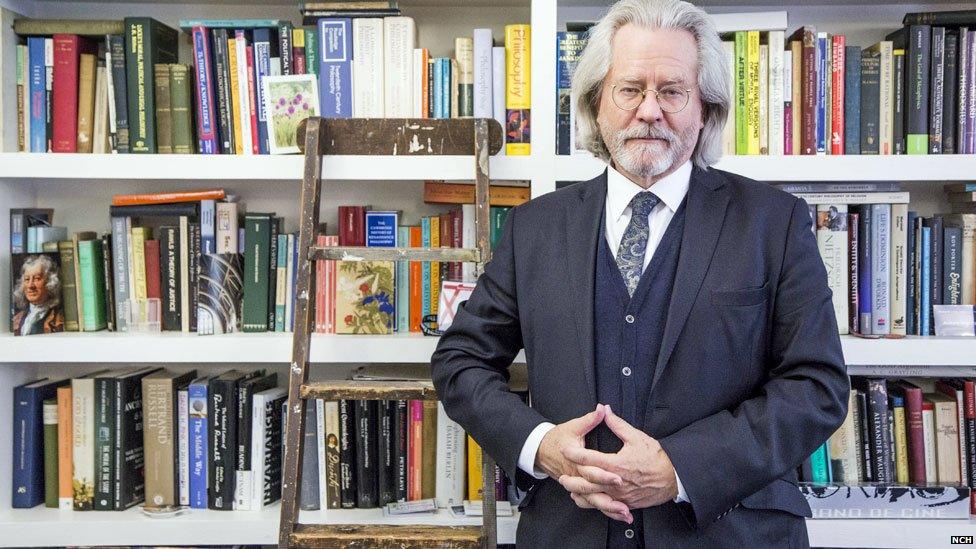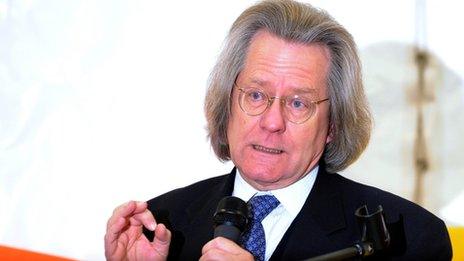AC Grayling says end 'closed shop' for new universities
- Published

The current system for allowing new universities to open is "byzantine and over-complex", says Prof Grayling
The UK university sector should be open to new types of institution and stop being such a "closed shop", says leading academic AC Grayling.
Prof Grayling is the head of the New College of the Humanities, which wants to gain degree-awarding powers.
Under the current system, Prof Grayling says it is "virtually impossible" to set up a new university.
The government is about to publish a consultation on the future shape of higher education.
Universities minister Jo Johnson's green paper, which should appear before the end of the year, is expected to include proposals to make it easer for new institutions to open.
'Byzantine'
"At the moment higher education is very much a closed shop," Prof Grayling told the BBC.

Jo Johnson is expected to publish plans for the future shape of higher education in the UK
His college opened in London four years ago but has to offer degrees validated by other existing universities.
"The regulatory regime is byzantine and over-complex, expensive and time-consuming. It's virtually impossible for a new higher education institution to come into existence," he said.
Prof Grayling says there needs to be a central body with responsibility for accrediting and monitoring would-be new entrants and making sure their degrees were "up to scratch".
"I'm bursting with ideas with what we could do here, what programmes we could offer, how we could innovate.
"I cannot do it, because I cannot award degrees yet. The ability to do so would infuse so much fresh blood and new ideas into higher education.
"Let's be open to new kids on the block with some feisty ideas. But let them prove themselves constantly, let them be constantly under scrutiny."
Fee increase
Prof Grayling says he would like to expand the Bloomsbury college from about 50 students a year to 300.
The philosopher and author wants a tough regulatory and inspection system to ensure quality, alongside a less rigid approach to new providers.
The New College of the Humanities, a private college, had a controversial launch when it announced fees of £18,000 per year.
The green paper could propose allowing public universities to charge more than the current £9,000 maximum in England, if they can demonstrate sufficient quality in teaching.
Prof Grayling predicts an "upward pressure" on fees across higher education, with a continuing trend for more costs on students rather than taxpayers.
But pushing fees higher could exclude "whole constituencies of people", he added.
He argues that the long-term response should be for universities to move towards the US-style endowment model, with universities having sufficient funds to be financially autonomous, so that they can admit talented students regardless of their ability to pay.
For example, Harvard University draws most of its operating budget from the income from its endowment, currently worth $36bn (£23bn).
Teaching quality
Prof Grayling backs the government's anticipated emphasis on the quality of teaching, which he says has too often been the "poor cousin" compared with research.
A commitment to teaching and inspiring students should be part of the life of a university, he says, producing well-educated graduates with "all the lights switched on".
There have been proposals for a "teaching excellence framework" which would assess the quality of teaching in universities, in the way that the "research excellence framework" examines the quality of research.
Mr Johnson has warned against inconsistent teaching standards.
"This patchiness in the student experience within and between institutions cannot continue. There is extraordinary teaching that deserves greater recognition. And there is lamentable teaching that must be driven out of our system," he has told university leaders.
- Published26 October 2015

- Published9 September 2015

- Published23 January 2012
